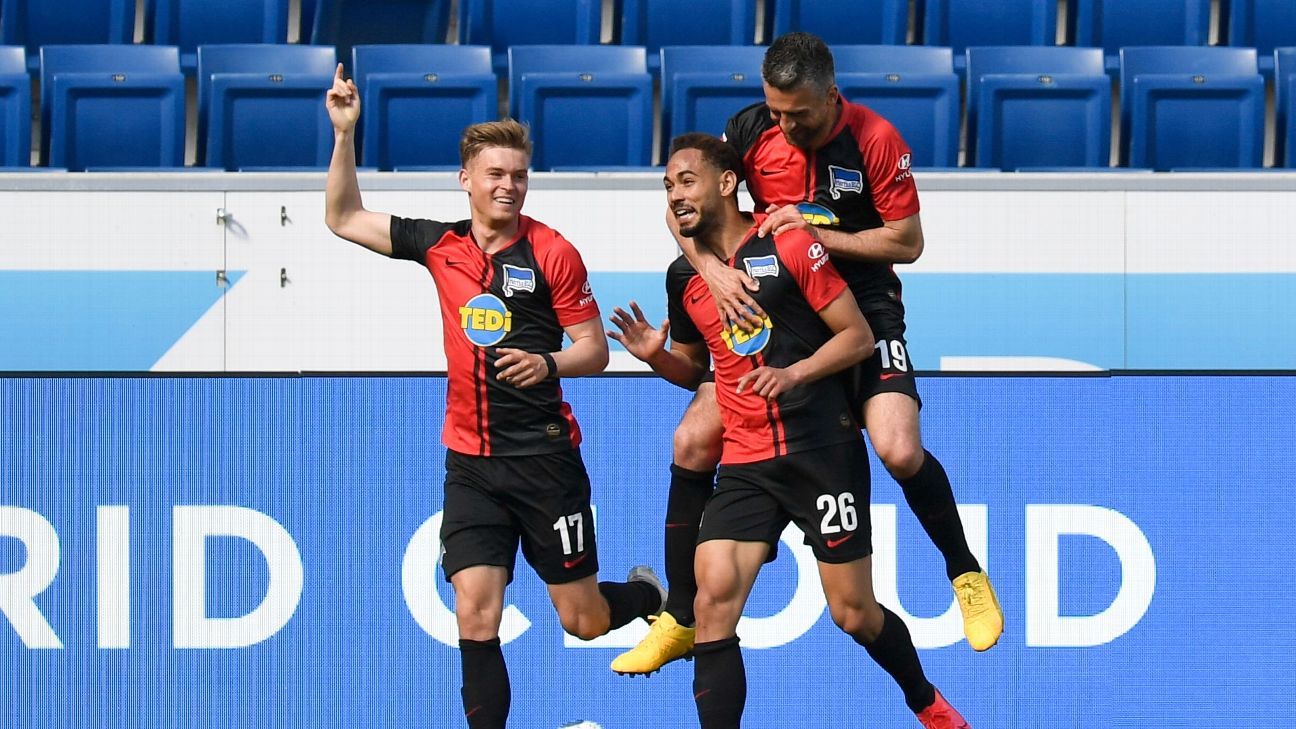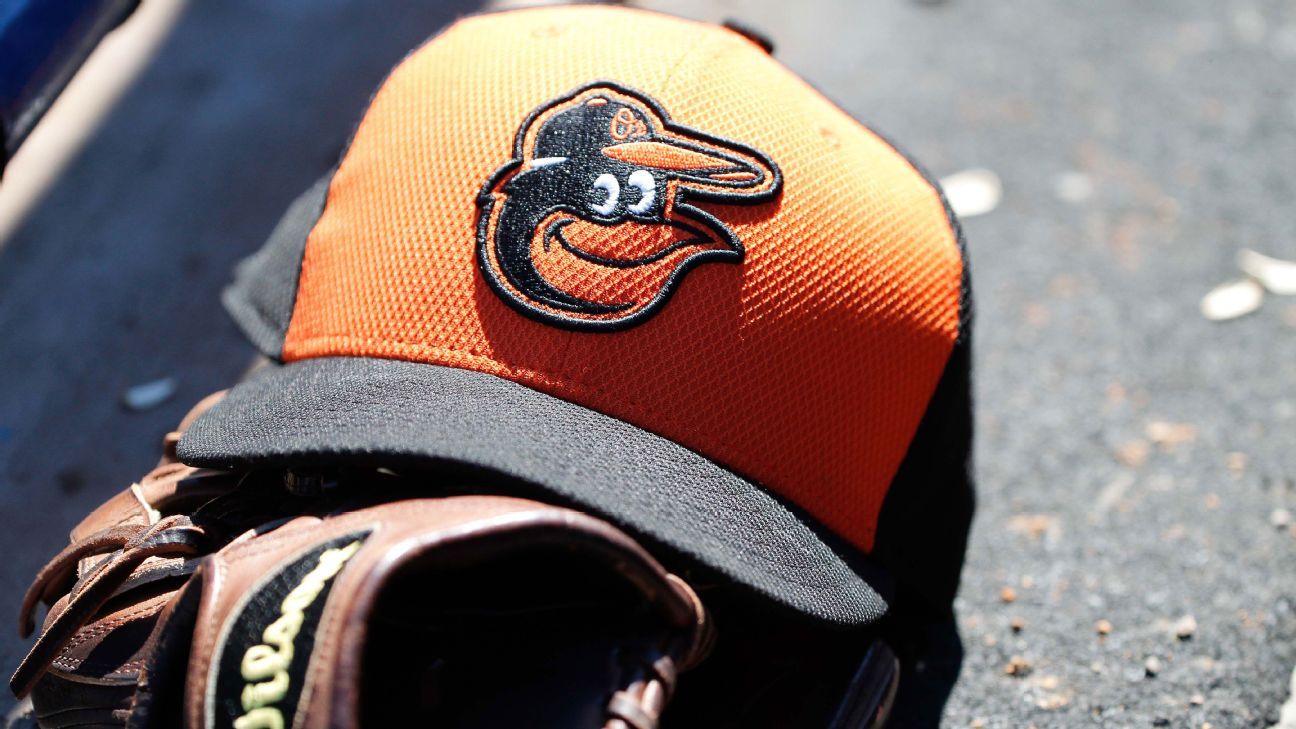
As the first major soccer league in the world to resume play following a coronavirus-induced stoppage that lasted more than two months, the Bundesliga returned to action over the weekend with the 26th of 34 rounds. And while meticulous planning ensured that the games behind closed doors went well on the whole, the restart did not come without controversy.
After 60 somewhat uneventful minutes of play between Hoffenheim and Hertha Berlin on Saturday, Vedad Ibisevic gave the capital city club a 2-0 lead against his former team. Coming as it did two minutes after they had taken the lead, the goal sparked jubilant scenes and Ibisevic was hugged by his teammates.
The group quickly separated as they presumably remembered the hygiene protocol laid out by the German Football League (DFL), but following Matheus Cunha's beautiful goal to make it 3-0, more joy followed and the Hertha players behaved as if they had scored in the pre-COVID era.
While Hertha will not be punished, the incidents were the subject of major discussion after the game and, on Sunday, somewhat overshadowing the fact that the Bundesliga had successfully staged multiple matches. Hertha head coach Bruno Labbadia, though, was not concerned about his players ignoring physical distancing rules after goals.
"Soccer is a contact sport," he said. "The teams have been tested six times. We are close to the opponents during every duel, every corner kick. We cannot prevent such things. It is a fine line we are walking."
- Hamilton, Uersfeld: What we learned as the Bundesliga resumed
- Photo story: Bundesliga's return in pictures
- Stream Bundesliga debate on FC TV on ESPN+
Beyond the new regulations, one aspect of Hertha's celebration -- with the usual backslapping, high-fiving and hugging -- was that it showed otherwise rare emotion. It quickly became apparent on Saturday that, while well-organised and driven by precaution, the matches lacked atmosphere.
The instructions by the league, outlined in a 51-page hygiene and safety protocol and an "organisational letter" sent to the clubs two weeks ago, paid attention to every detail and helped lead Markus Soder, state premier of Bavaria, which is the home of five Bundesliga and Bundesliga II clubs, to conclude during a Sunday morning talk show on Sport1 that "the experiment was successful."
Soder was among the early political supporters of a restart and his faith was largely vindicated, but seeing the pictures of celebrating players also meant he issued a warning: "The league will re-adjust some things. I'm certain about that. Soccer is a role model."
"We must definitely be careful now that we play under this situation," Hertha defender Dedryck Boyata wrote on Instagram. "We have to adapt our way to play or celebrate."
Celebrating players could send the wrong message, and the recommendation to avoid hugging is also justified from an epidemiological point of view. The DFL tries to prevent players getting in close contact because its medical task force wants them to be categorised as "second-degree contact persons," meaning that, in the case of a positive COVID-19 test, the entire team would not have to quarantine. (According to the Robert Koch Institute, Germany's federal agency responsible for disease control, someone becomes a "first-degree contact person" if he or she person had close face-to-face contact with an infectious individual for at least 15 minutes.)
Yet despite a few hiccups, many in the league were satisfied with how the weekend went, not to mention the global attention toward the league.
"The entire sports world is watching. I gave so many interviews to foreign media from England, Spain, Italy, and the U.S. in recent weeks," Eintracht Frankfurt sporting director Fredi Bobic told ZDF.
Bayern Munich chairman Karl-Heinz Rummenigge predicted one billion total TV viewers for the weekend. That might be impossible to prove one way or another, but domestic broadcaster Sky Deutschland was happy about a new ratings record, with over six million Germans watching the Saturday afternoon matches that included the Revierderby between Borussia Dortmund and Schalke 044.
It was a number to quiet those who hoped fans would boycott the broadcast of spectator-free games, although the eerie in-stadium silence, punctuated only by players and coaches shouting and referees' whistles, certainly made for an underwhelming TV experience and prompted some observers to call for the league to pipe in crowd noise.
Such a move would not appease everyone and the fact is that, while the reasons for caution might be understandable, many season-ticket holders and match-going supporters remain averse to these so-called Geisterspiele (ghost games).
"It is apparently necessary for economic reasons," Bayern supporter Christian Nandelstadt told ESPN. "If that's the case, I'm fine with it. But the clubs should not act as if they do every fan a favour."
"I attended every Hoffenheim match this season," Hoffenheim fan Julian Ritter said. "I don't enjoy watching soccer on TV as much as I enjoy it in the stadium. It's like looking through someone else's eyes."
RB Leipzig supporter Lars Noske said: "It felt like an away game, which I usually don't attend as I prefer to go to a bar or watch it on my couch at home. I felt an itch to go to the stadium just to be closer, but I remained steadfast and stayed at home. I didn't see any pictures of fans [trying to go to the stadium], which is good."
"I was skeptical before the match, and I remain skeptical afterward," Dortmund fan Nicolas Diekmann said. "Soccer without fans inside the stadium is not the same. It doesn't feel like a competition."
For their part, many of the players involved have a different view on the situation.
"This was no different from the games we used to play when we were children; without spectators, just having fun," Dortmund goalkeeper Roman Burki said after keeping a clean sheet against Schalke. "You could notice it in how our team played."
Bayern's Thomas Muller said on Sunday. "We handled it very professionally. Of course, it was a bit like a game of old timers, 7 p.m., floodlight atmosphere. But as soon as the ball started rolling, we were focused. We have to try to simply block it out."
"Of course, it feels like a friendly match," Borussia Monchengladbach midfielder Tobias Strobl told kicker. "But it's not about that. We are in a situation in which we are thankful that we are allowed to play at all."
"When we look back at what happened last week, it was quite dicey," Neven Subotic said. The Union Berlin defender was among the few players who publicly voiced their concerns about the restart. "Not everything went as smoothly as we hoped it would," he added. "It is alright that some players make mistakes; that is human. For now, we could grade ourselves with an 'OK', but we have to pay attention that certain mistakes don't happen again."
The Bundesliga's first matchday since early March finishes on Monday with Werder Bremen hosting Bayer Leverkusen at the Weser-Stadion. If the vast majority of COVID-19 tests performed this week come back negative, the league's new normal will continue to be at the centre of global attention and thus under the microscope.















 Phone: (800) 737. 6040
Phone: (800) 737. 6040 Fax: (800) 825 5558
Fax: (800) 825 5558 Website:
Website:  Email:
Email: 






